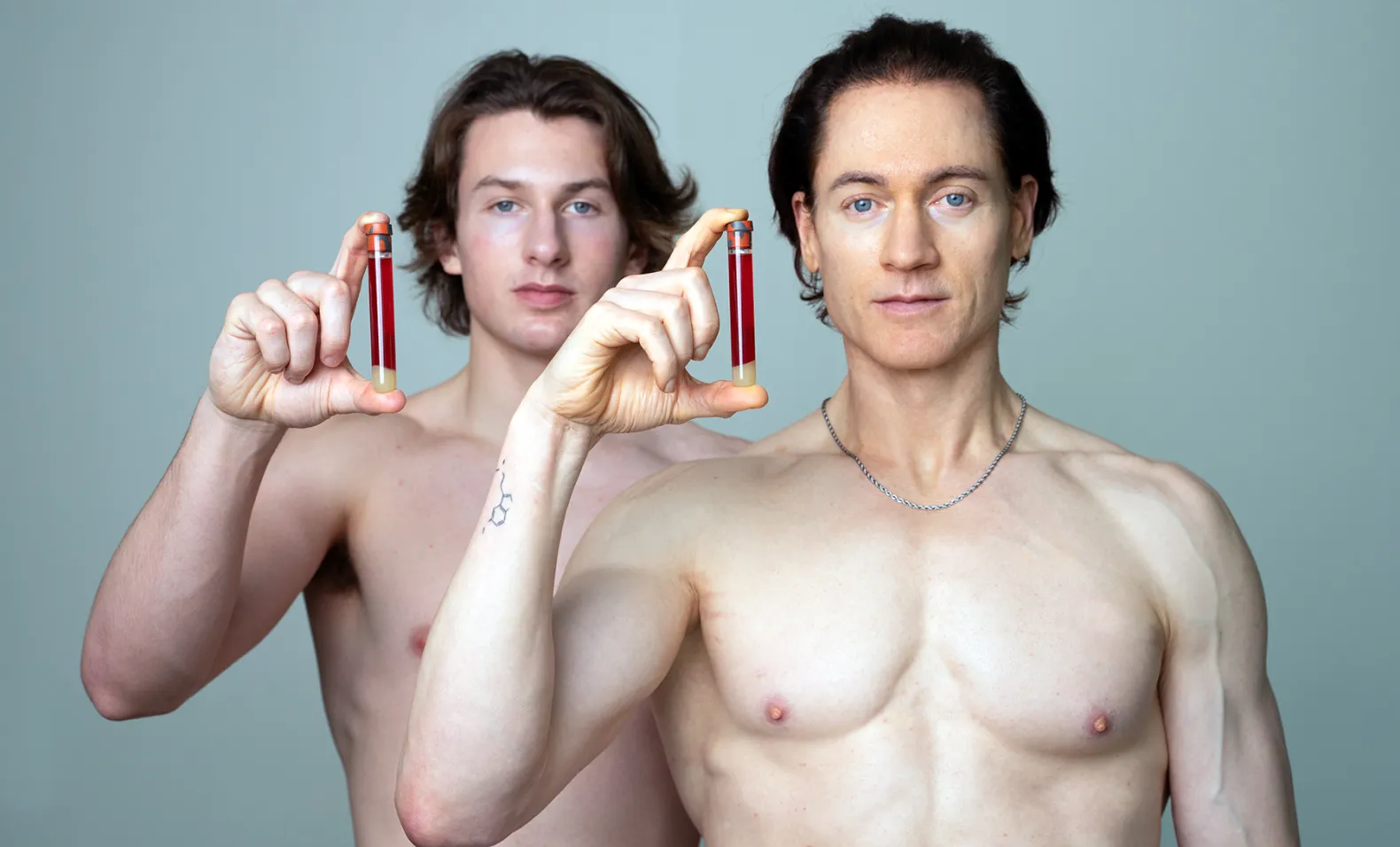For the better part of the past two centuries, the world of physical culture — perhaps more commonly referred to, in shorthand, as the world of “fitness” — has served as a battleground for vicious, seemingly all-or-nothing debates about the appropriate path to health. Doctors and nutritionists have debated all-vegetable diets, all-grain diets, all-meat diets, and any number of other dietary regimens; trainers have gone to the barricades to argue the merits of strength training, jogging, swimming, yoga, and assorted combinations thereof. One thing is always the same: each guru has their advocates, and these advocates are pushed to follow the one true path to good health.
Right now, however, observers can witness a truly unprecedented fitness debate playing out. Bryan Johnson — a pale, sinewy 46-year-old tech mogul and biohacker who claims to be spending $2 million a year on various procedures and chemicals intended to rejuvenate everything from his “baby face” to a more virile, blood-gorged, adolescent-style penis — has found himself in the midst of a debate with the someone from the opposite end of the spectrum. Known as ‘Sol Brah’ on X, this man is an extremely online fitness “physical spiritualist, nature enthusiast, and aesthetic curator”, who peddles a back-to-nature philosophy popularised by the likes of the now-disgraced Liver King.
Between these two, the question — at least to fans of one “team” or another, science or nature — is simple enough: which method will lead to superior health? Fans of “team science” are quick to point out that time-tested methods of our ancestors — if we can even all agree what those are — have existed for millennia but have failed to stave off death, whereas Johnson is trying something new.
On the other end of the spectrum, Sol Brah champions a qualified return to nature. Embracing a philosophy that emphasises the importance of natural environments and elements of ancestral lifestyles, Sol Brah’s approach — which nevertheless incorporates a host of modern supplements that he sells on his site — is reflective of a growing disillusionment with the modern, technologically driven world. This perspective often criticises the over-reliance on artificial enhancements and advocates for a more balanced way of living, though with thoughtful carve-outs in areas where Sol Brah believes supplements offer benefits.
As with so much else in the guru-led fitness world that author Randy Roach described as “muscle, smoke, and mirrors,” there’s a kayfabe element to this debate, which is, quite naturally, playing out in public view on social media. Johnson is undergoing or taking everything in the pseudoscientific book, and the amount he spends on these treatments is a key part of his personal mythos. Sol Brah, meanwhile, boasts about drinking beetroot and pomegranate juice because such fluids resemble animal blood even as he, like a more conventional influencer, maintains well-stocked storefronts that sell his supplements, books, and apparel.
A summit featuring these two men would certainly excite the extremely online fitness stans, but its impact on the ever-worsening health of people in industrialised democracies is likely to be negligible. One of the enduring paradoxes of the extremely online fitness space is that we have never seen so many ripped bodies, impressive gym lifts, and competing forms of expertise floating around — yet never have the “unwashed masses” carried more fatty mass or, at least as far as recorded evidence goes, produced less testosterone. The 1% (and certainly the .0001%, or whatever class Johnson might place himself) have many efficacious tools in the toolkit — including steroids, growth hormone, and weight-loss drugs like Ozempic and Mounjaro — that should constitute a bare-minimum for those pursuing an optimised state of being.
The extreme lifestyle measures undertaken by figures like Johnson and Sol Brah are impractical for most people. The behind-the-scenes realities of such lifestyles are often obscured — consider how far the Liver King’s reality was from his self-presentation — and the grandiose displays on social media do not reflect the everyday health needs of the general population. Simple physical exercise, rarely discussed and even more rarely practised amid these rarified biohacking debates, is, in truth, always going to be the most effective approach for most people.











Join the discussion
Join like minded readers that support our journalism by becoming a paid subscriber
To join the discussion in the comments, become a paid subscriber.
Join like minded readers that support our journalism, read unlimited articles and enjoy other subscriber-only benefits.
Subscribe